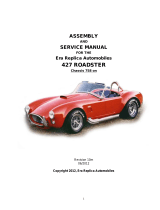Page is loading ...

Description
Tilton’s Mitsubishi EVO clutch packages are designed to oer increased torque capacity
and reduced rotating mass. In addition, these clutch packages include a concentric hy-
draulic release bearing assembly that eliminates the stock external slave cylinder and re-
lated linkage. The clutch provides high torque capacity that enables you to “turn up the
boost" while it’s reduced rotating mass results in increased horsepower to the wheels.
The hydraulic release bearing self-adjusts for clutch wear and provides great pedal feel.
These clutch packages have been designed to be as “bolt-in" as possible, retaining the
stock 5/8" bore master cylinder to provide ecient and comfortable clutch modulation.
Note: This instruction sheet is designed to supplement the general instructions
sheets supplied with the individual components of the clutch package.
installation
Flywheel
1. Install ywheel onto engine. Torque OEM ywheel-to-crankshaft bolts to factory
specication.
Note: The stock ywheel was not designed to accept an input shaft pilot bearing. We
have designed our ywheel to accept a pilot bearing
(NTN part# 6202LLU) to support the transmission’s input shaft in high horsepower
applications. If you choose to use a pilot bearing, you will also need to install a 15mm
pilot extension on the input shaft.
clutch Discs
2. Install clutch discs into the clutch. For Carbon/Carbon clutches, orient the clutch hub as
shown in Diagram 1. For Cerametallic clutches, align hubs as shown in Diagram 2.
Be sure to align discs with an alignment tool or spare input shaft.
clutch
3. Mount clutch onto the ywheel with the supplied aircraft grade hardware. Torque hard-
ware to 18 lb-ft using oil or Loctite. The tips of the spring ngers should taper slightly
towards the transmission. The spring must not be inverted.
4. Test t the transmission to the engine to conrm that there is no interference between
the clutch’s spring retaining hardware and the inside of the transmission case. There
should be .075" of clearance, but due to variations in transmission castings the clearance
may be decreased. If there is interference, you may have to grind the tips of the spring
retaining screws to be ush with the nuts and/or grind some material from the transmis-
sion case.
Note: This clutch package is designed for use with the 5-speed (non-MR) transmission only.
Mitsubishi EVO Clutch Package
INSTALLATION INSTRUCTIONS
98-1122
V = Solid, 8 rivet, outer (.375" thick)
W = Solid, 8 rivet, outer (.550" thick)
V W
FLYWHEEL
CLUTCH COVER
FLYWHEEL
CLUTCH COVER
Oset
Diagram 1
Diagram 2

installation: hyDraulic release Bearing assemBly
1. Remove the existing Original Equipment (OE) slave cylinder, fork arm and release
bearing from the transmission.
Note: To remove the release bearing unit you must pry a plug from the
transmission case and remove the fork pin.
2. Remove the pilot tube from the transmission. Check the input shaft seal and
replace if necessary. Clean the bearing retainer/pilot tube surface and bolt holes.
3. Install the provided hydraulic release bearing mount adapter (P/N 62-9900),
positioning the hydraulic release bearing’s mounting holes so that they are
parallel to the ground as shown in Diagram 3. The adapter must sit ush on the
mounting surface. Install the four (4) M6X1X14 at head screws that are provided.
4. Before installing the hydraulic release bearing (P/N 61-9002 or 61-9012), route the
supplied AN3 steel braided line to exit the transmission case without any sharp
bends or kinks. If necessary, remove the rubber boot vent that is located at the
upper left of the input shaft to create a convenient hole in the transmission case.
Directions on how to trim and connect hydraulic lines are provided in the instruc-
tions that came with the 9000-Series hydraulic release bearing included in the
package. Connect the supply line to the master cylinder with the banjo adapter
and banjo bolt that is provided.
5. Thread the supplied ttings into the hydraulic release bearing. Install the hydraulic
release bearing onto the mount adapter with the two (2) M6X1X10 cap head
screws provided. Make sure that the highest port on the hydraulic release is used
as the bleed line port, as shown in Diagram 3. Connect the supply and bleed lines
to the hydraulic release bearing.
6. Remove the “helper/over center” spring from the clutch pedal assembly as shown
in Diagram 4. This spring is designed to help overcome the resistance of the stock
clutch’s diaphram spring, making clutch disengagement easier (less pedal eort).
This spring is not needed for use with the Tilton clutch package, due to the sup-
plied hydraulic release bearing assembly.
7. Install the pedal stop (P/N 72-008) that is included in your clutch kit using the
instructions below.
clutch peDal stop
A positive clutch pedal stop must be used to prevent over-stroking the hydraulic
release bearing piston and the clutch. For access reasons, in many cars it is not easy to
determine how far the master cylinder is being stroked.
The method listed below provides a very eective method for adjusting the pedal
stop:
1. Lift the drive wheels o the ground and support the car on jack stands.
2. With the engine o, place the gearbox in rst gear and have someone attempt to
rotate the drive wheels.
3. Depress the clutch pedal slowly until the clutch disengages and the drive wheels
can be rotated.
4. Adjust pedal stop to allow another 1/4” of pedal travel. This should provide
clean release of the clutch. Do not stroke the pedal any further than this point
throughout this procedure, otherwise you will over-stroke the clutch.
±5°
FROM
HORIZONTAL
BLEED PORT
Diagram 3
Diagram 4
Tilton Engineering, Inc. 25 Easy Street • PO Box 1787 • Buellton, CA 93427 • www.tiltonracing.com
FIREWALL
Adjustable
Pedal stop
Pedal position where
clutch breaks free.
1/4" additional travel
(exaggerated for clarity)
Pedal position where
pedal stop should be set.
Never travel clutch
pedal past this point!
Diagram 5
/










